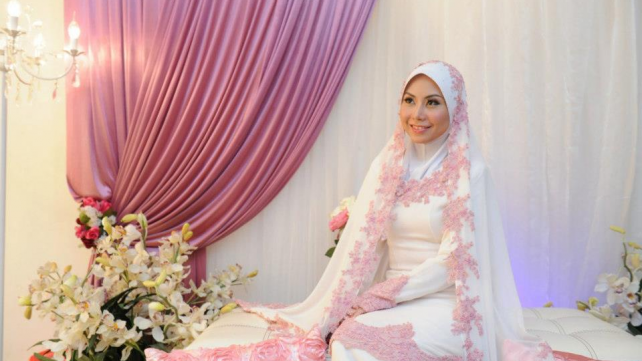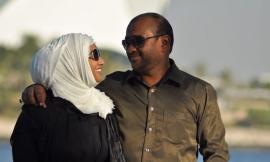
Quran and Hadith about marriage. What does Nikah mean and what does it take to enter into a marriage agreement in Islam? It is a strong contract or covenant (mithaqun Ghalithun) as expressed in Quran 4:21.
Mutual Agreement of Bride and Groom
Marriage (nikah) is a solemn and sacred social contract between bride and groom. This contract is a strong covenant (mithaqun ghalithun) as expressed in Quran 4:21. The marriage contract in Islam is not a sacrament. It is revocable.
Both parties mutually agree and enter into this contract. Both bride and groom have the liberty to define various terms and conditions of their liking and make them a part of this contract.
Mahr
The marriage-gift (Mahr) is a divine injunction. The giving of mahr to the bride by the groom is an essential part of the contract.
'And give the women (on marriage) their mahr as a (nikah) free gift" (Quran 4:4)
Mahr is a token commitment of the husband's responsibility and may be paid in cash, property or movable objects to the bride herself. The amount of mahr is not legally specified, however, moderation according to the existing social norm is recommended. The mahr may be paid immediately to the bride at the time of marriage, or deferred to a later date, or a combination of both. The deferred mahr however, falls due in case of death or divorce.
One matrimonial party expresses 'ijab" willing consent to enter into marriage and the other party expresses 'qubul" acceptance of the responsibility in the assembly of marriage ceremony. The contract is written and signed by the bride and the groom and their two respective witnesses. This written marriage contract ("Aqd-Nikah) is then announced publicly.
Sermon
The assembly of nikah is addressed with a marriage sermon (khutba-tun-nikah) by the Muslim officiating the marriage. In marriage societies, customarily, a state appointed Muslim judge (Qadi) officiates the nikah ceremony and keeps the record of the marriage contract. However any trust worthy practicing Muslim can conduct the nikah ceremony, as Islam does not advocate priesthood. The documents of marriage contract/certificate are filed with the mosque (masjid) and local government for record.
Prophet Muhammad (S) made it his tradition (sunnah) to have marriage sermon delivered in the assembly to solemnize the marriage. The sermon invites the bride and the groom, as well as the participating guests in the assembly to a life of piety, mutual love, kindness, and social responsibility.
The Khutbah-tun-Nikah begins with the praise of Allah. His help and guidance is sought. The Muslim confession of faith that 'There is none worthy of worship except Allah and Muhammad is His servant and messenger" is declared. The three Quranic verses (Quran 4:1, 3:102, 33:70-71) and one Prophetic saying (hadith) form the main text of the marriage. This hadith is:
'By Allah! Among all of you I am the most God-fearing, and among you all, I am the supermost to save myself from the wrath of Allah, yet my state is that I observe prayer and sleep too. I observe fast and suspend observing them; I marry woman also. And he who turns away from my Sunnah has no relation with me". (Bukhari)
The Muslim officiating the marriage ceremony concludes the ceremony with prayer (Dua) for bride, groom, their respective families, the local Muslim community, and the Muslim community at large (Ummah)
Marriage (nikah) is considered as an act of worship (ibadah). It is virtuous to conduct it in a Mosque keeping the ceremony simple. The marriage ceremony is a social as well as a religious activity. Islam advocates simplicity in ceremonies and celebrations.
Prophet Muhammad (S) considered simple weddings the best weddings:
'The best wedding is that upon which the least trouble and expense is bestowed". (Mishkat)
Primary Requirements
- Mutual agreement (Ijab-O-Qubul) by the bride and the groom
- Two adult and sane witnesses
- Mahr (marriage-gift) to be paid by the groom to the bride either immediately (muajjal) or deferred (muakhkhar), or a combination of both
Secondary Requirements
- Legal guardian (wakeel) representing the bride
- Written marriage contract ("Aqd-Nikah) signed by the bride and the groom and witnesses by two adult and sane witnesses
- Qadi (State appointed Muslim judge) or Ma'zoon (a responsible person officiating the marriage ceremony)
- Khutba-tun-Nikah to solemnize the marriage
The Marriage Banquet (Walima)
After the consummation of the marriage, the groom holds a banquet called a walima. The relatives, neighbors, and friends are invited in order to make them aware of the marriage. Both rich and poor of the family and community are invited to the marriage feasts.
Prophet Muhammad (S) said:
'The worst of the feasts are those marriage feasts to which the rich are invited and the poor are left out". (Mishkat)
It is recommended that Muslims attend marriage ceremonies and marriage feasts upon invitation.
Prophet Muhammad (S) said:
"...and he who refuses to accept an invitation to a marriage feast, verily disobeys Allah and His Prophet". (Ahmad & Abu Dawood)
Printed with permission: Marriage and Family in Islam by Mohammad Mazhar Hussaini








Comments
Multiple Marriages
According to the Quran, there is no mandatory requirement for a married man to marry another woman. However, it is customary to inform and have consent.
Location
assalamualaikum sir you r
assalamualaikum sir you r right .man dnt need requirement to marry a woman I respect thz answer .
Location
Is it allowed for later ceremony
Is it permissible to do the signing and all then later after one year or so do the walima
Location
Is it acceptable
my friend loved a person and getting closer day by day.but it is Haram in islam and then they decided to get married.our friends was their witness and they followed every rules.but we didnot signed in any paper.
is it accepted in Islam??
is it legal?
Location
Please always seek help a
Please always seek help a scholar
why zre mahr needed
why zre mahr needed
Location
beacause Allah and his
beacause Allah and his prophet said so
Mahr
Salamaleikum wata barakato, mahr is a gift from our husbands to the wives , like a wedding gift but its for the relationship, not the wedding. follow of what our prophet (saw) taught us.
Location
Is my marriage accepted
Please can some one guide me.I'm still legally married to my ex through British law..II asked for a NIKHA to be conducted through my in-laws in Tunisia to their son.but I can't be legally married through Tunisian law.however there was no ljab or Kabul exchanged at all both signed a legal paper front of 2 witnesses and a freind who made us all sign.and only rings we're exchanged no MAHR no kuthbah read to us only allhamdullilah after signature..IS THIS A VALID MARRIAGE.PLUS I HAD NO WALI..IM NOTV ACCEPTING THIS AT ALL AS A VALID MARRIAGE SO I CAME BACK TO UK.WITHOUT ANY RELATIONSHIP IVE LIKE HIM FOR 1 YEAR.HE PROPOSED BUT I EXPECTED A RELIGIOUS CEREMONY.. HIS SAYING THIS MARRIAGE IS VALID THROUGH ALLAHS EYE.THIS WAS A TUNISIAN LEGAL MARRIAGE PAPER.WHICH WE BOTH ARE AWARE CANT BE REGISTERED TILL IM DIVORCED BY LAW.BUT THROUGH ISLAMIC PROSPECT I WANTED A NIKHA WITH HIM..HIS A MALIKI AND IM HANIFI
Location
is it a legal marriage???
assalaam allaikum i wanted to ask if both the bride and groom n both parents and parties have consented to the marriage bt no contract has been signed and that the parents agreed for both of them to begin planning their future including the mahr bt have been told to stay apart till they clear their studies. are they realy allowed to consumate the marriage??? and does the marriage exist here???
Location
Pages
Add new comment